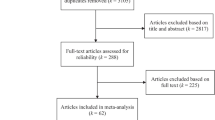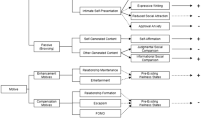Abstract
Internalizing and externalizing problems differ by musical tastes. A high school-based sample of 4159 adolescents, representative of Dutch youth aged 12 to 16, reported on their personal and social characteristics, music preferences and social-psychological functioning, measured with the Youth Self-Report (YSR). Cluster analysis on their music preferences revealed six taste groups: Middle-of-the-road (MOR) listeners, Urban fans, Exclusive Rock fans, Rock-Pop fans, Elitists, and Omnivores. A seventh group of musically Low-Involved youth was added. Multivariate analyses revealed that when gender, age, parenting, school, and peer variables were controlled, Omnivores and fans within the Exclusive Rock groups showed relatively high scores on internalizing YSR measures, and social, thought and attention problems. Omnivores, Exclusive Rock, Rock-Pop and Urban fans reported more externalizing problem behavior. Belonging to the MOR group that highly appreciates the most popular, chart-based pop music appears to buffer problem behavior. Music taste group membership uniquely explains variance in both internalizing and externalizing problem behavior.
Similar content being viewed by others
References
Anderson CA, Carnagey NL, Eubanks J (2003) Exposure to violent media: the effects of songs with violent lyrics on aggressive thoughts and feelings. J Pers Soc Psychol 84:960–971
Arnett JJ (1991) Heavy metal music and reckless behavior among adolescents. J Youth Adolesc 20:573–592
Arnett JJ (1996) Metalheads. Heavy metal music and adolescent alienation. Westview Press, Boulder
Achenbach TM (1991) Manual for the Youth Self-Report and 1991 Profile. University of Vermont Department of Psychiatry, Burlington
Bailey KD (1994) Typologies and taxonomies: An introduction to classification techniques. Series: Quantitative applications in the social sciences, 07-102. Sage, London
Binder A (1993) Constructing racial rhetoric- Media depictions of harm in heavy-metal and rap music. Am Sociol Rev 58:753–767
Bourdieu P (1979) Distinction. A social critique of the judgment of taste. Routledge, London
Brown BB, Mory M, Kinney D (1994) Casting adolescent crowds in a relational perspective: Caricature, channel, and context. In: R, Adams GR, Gullotta TP (eds) Advances in adolescent development: Personal relationships during adolescence, vol 6. Sage, Newbury Park, CA
Bryson B (1996) “Anything but heavy metal”: Symbolic exclusion and musical dislikes. Am Sociol Rev 61:884–899
Carpentier FD, Knoblauch S, Zillmann D (2003) Rock, rap, and rebellion: Compaisons of traits predicting selective exposure to defiant music. Pers Individ Differ 35:1643–1655
Christenson PG, Peterson JB (1988) Genre and gender in the structure of music preferences. Commun Res 15:282–301
Christenson PG, Roberts DF (1998) It's not only rock and roll. Popular music in the lives of adolescents. Hampton Press, Cresskill, NJ
Cohen J (1988) Statistical power analysis for the social sciences. Laurence Erlbaum, Hillsdale, NJ
Currie CE, Elton RA, Todd J, Platt S (1997) Indicators of socioeconomic status for adolescents: the WHO Health Behaviour in School-aged Children Survey. Health Educ Res, Theory Pract 12:385–397
Ferdinand RF, Verhulst FC, Wiznitzer M (1995) Continuity and change of self-reported problem behaviors from adolescence into young adulthood. J Am Acad Child Adolesc Psychiatr 34:680–690
Fisher CS (1982) To dwell among friends. Personal networks in town and city. Chicago University Press, Chicago
Fried C (2003) Stereotypes of music fans: Are rap and heavy metal fans a danger to themselves or others? J Media Psychol 8 (on line journal)
Frith S (1978) The sociology of rock. Constable, London
Gerbner G (1998) Cultivation analysis: An overview. Mass Commun Soc 1:175–194
Hansen CH (1989) Priming sex-role stereotypic event schemas with rock music videos: Effects on impression favorability, trait inferences, and recall of a subsequent male-female interaction. Basic Appl Soc Psychol 10:371–391
Hansen CH, Hansen RD (1990) Rock music videos and antisocial behavior. Basic Appl Soc Psychol 11:357–369
Lacourse E, Claes M, Villeneuve M (2001) Heavy metal music and adolescent suicidal risk. J Youth Adolesc 30:321–332
Loeber R, Farrington DP, Stouthamer-Loeber M, Van Kammen WB (1998) Multiple risk factors for multiproblem boys: Co-occurrence of delinquency, substance use, attention deficit, conduct problems, physical aggression, covert behaviour, depressed mood, and shy/withdrawn behaviour. In: Jessor R (ed) New perspectives on adolescent risk behaviour. Cambridge University Press, Cambridge, pp 90–149
Mandara J (2003) The typological approach in child and family psychology: A review of theory, methods, and research. Clin Child Fam Psychol Rev 6:129–146
Martin G, Clarke M, Pearce C (1993) Adolescent suicide: Music preference as an indicator of vulnerability. J Am Acad Child Adolesc Psychiatr 32:530–535
Meeus W (1989) Parental and peer support in adolescence. In: Hurrelman K, Engels U (eds) The social world of adolescents. de Gruyter, New York, pp 167–185
Miranda D, Claes M (2004) Rap music genres and deviant behaviors in French-Canadian adolescents. J Youth Adolesc 33(2):113–122
North AC, Hargreaves DJ, O’Neill SA (2000) The importance of music to adolescents. Br J Educ Psychol 70:255–272
Peterson RA, Kern RM (1996) Changing highbrow taste: From snob to omnivore. Am Soc Rev 61:900–907
Raaijmakers QAW (1999) Effectiveness of different missing data treatments in surveys with Likert-type data: Introducing the relative mean substitution approach. Educ Psychol Meas 59:725–748
Rentfrow PJ, Gosling SD (2003) The Do Re Mi's of everyday life: The structure and personality correlates of music preferences. J Pers Soc Psychol 84:1236–1256
Roe K (1995) Adolescents’ use of socially disvalued media: Towards a theory of media delinquency. J Youth Adolesc 24:617–631
Scheel KR (1995) Preference for heavy metal music as a potential indicator of increased suicidal risk among adolescents. Unpublished thesis, University of Iowa, Iowa City
Scheel KR, Westefeld JS (1999) Heavy metal music and adolescent suicidality: An empirical investigation. Adolescence 34:253–273
Stack S, Gundlach J, Reeves JL (1994) The heavy metal subculture and suicide. Suicide Life-Threat Behav 24:15–23
Steinberg L, Morris AS (2001) Adolescent development. Annu Rev Psychol 52:83–110
Steinberg L, Silverberg SB (1986) The vicissitudes of autonomy in early adolescence. Child Dev 57:841–851
Steinberg L (2002) Adolescence, 6th edn. McGraw-Hill, Boston
Stevens F (2001) Gemaakte keuzes? Een analyse van de muziek- en mediapreferenties van Vlaamse jongeren [Choices Made? An analysis of the music and media preferences of Flemish youth]. Sociologische Gids 48:138–155
Ter Bogt T (1997) One Two Three Four… Popmuziek, jeugdcultuur en stijl. [One, Two, Three, Four… Pop music, youth culture, and style]. Utrecht, Lemma
Ter Bogt T (2004a) Tijd onthult alles: Popmuziek, ontwikkeling, carrières. [Time is a revelator: Pop music, development, careers]. University of Amsteram/Vossius Press, Amsterdam
Ter Bogt T (2004b) De smaak van bloed: muziek en problemen van adolescenten [The Taste of Blood: Music and problems of adolescents]. Paper presented at the Dean's Symposium, University of Amsterdam, 16 September 2004
Ter Bogt T, Raaijmakers Q, Vollebergh W, Van Wel F, Sikkema P (2003) Youngsters and their musical taste: Musical styles and taste groups. Neth J Soc Sci 39:35–52
Ter Bogt T, Van Dorsselaer S, Vollebergh W (2002) Psychische gezondheid, risicogedrag en welbevinden van Nederlandse scholieren. [Psychological health, risk behavior en well being of Dutch students]. Trimbos Instituut, Utrecht
Tillekens G (1993) Het patroon van de popmuziek: De vier dimensies van jeugdstijlen [The structure of pop music: Four dimensions of style]. Sociologische Gids 40:177–194
Townsend P (1987) Deprivation. J Soc Policy 16:125–146
Van Eijck K (1999) Jazzed up, brassed off: Sociale differentiatie in patronen van muzikale genrevoorkeuren [Social differentiation in musical taste patterns]. Mens Maatschappij 74:43–61
Verhulst FC, Van der Ende J, Koot HM (1997) Handleiding voor de Youth Self-Report (YSR) [Youth Self-Report manual]. Rotterdam, Rotterdam, EU
Vollebergh WAM, Van Dorsselaer S, Monshouwer K, Verdurmen J, Ter Bogt T (submitted) Mental health problems in school children in the Netherlands: results from the Dutch HBSC-study 2001. Wardle K, Robb K, Johnson F (2002) Assessing socio-economic status in adolescents: the validity of a home affluence scale. J Epidemiol Community Health 56:595–599
Weinstein D (2000) Heavy metal: The music and its culture (Rev ed). Da Capo Press, Cambridge
Zillmann D, Gan S (1997) Musical taste in adolescence. In: Hargreaves DJ, North AC (eds) The social psychology of music. University Press, Oxford, pp 161–187
Author information
Authors and Affiliations
Corresponding author
Rights and permissions
About this article
Cite this article
Mulder, J., Bogt, T.t., Raaijmakers, Q. et al. Music Taste Groups and Problem Behavior. J Youth Adolescence 36, 313–324 (2007). https://doi.org/10.1007/s10964-006-9090-1
Received:
Accepted:
Published:
Issue Date:
DOI: https://doi.org/10.1007/s10964-006-9090-1




